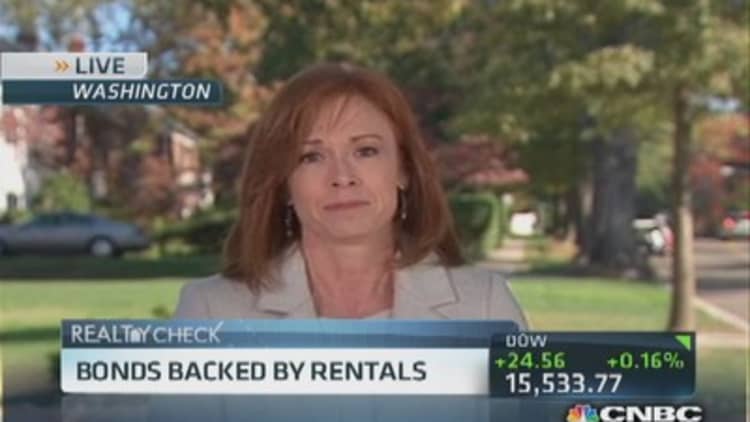
It feels like back to the future in bonds. A brand-new investment product will launch next week that is born of the housing and mortgage crashes but based on the same strategy that caused at least some of the crisis.
Blackstone, the largest investor in single-family rental homes, is introducing a new security backed by those homes. The as-yet unnamed bond will provide investors with not only an income stream from rental properties but also a potential return if they are sold. Much like a mortgage-backed security (MBS), it is a rental-backed security.
JPMorgan, Deutsche Bank and Credit Suisse will market about $500 million of the securities, said sources close to the matter. At least one of the tranches will be triple-A rated, according to sources, although ratings firms said to be involved would not comment.
(Read more: US extends backing for higher-priced mortgages)
Through its Invitation Homes, Blackstone had invested an estimated $5.5 billion in 32,000 homes, according to a KBW report in September, and has continued buying aggressively. The homes are largely in Western states, where the foreclosure crisis hit hardest.
Overall, investors have bought close to 200,000 foreclosed homes in the last few years, sinking nearly $20 billion into this new asset class. Blackstone would not comment on the bond deal, but competitors are watching closely.
"I do believe that securitization serves a great purpose if done well," said Laurie Hawkes, president and chief operating officer of Arizona-based American Residential Properties, a single-family REIT. "But I think it takes a little more development coming."
Home prices have increased dramatically this year, far more than some expected. That has shrunk investor margins for rental houses. This new security could be a way to exchange one type of leverage for another, or even gain new leverage. Potential investors are intrigued but leery.
"Are we protected like we are in traditional ABS [asset-backed securities] and RMBS [residential mortgage-backed securities] fields?" asked Bryan Whalen, managing director of U.S. fixed income at TCW. "From an ongoing perspective, we want to look at the operations. It is a new asset class, so we want to make sure that the sponsor that has invested the equity is going to be able to collect rents, rerent these properties in a fairly short time period and be very efficient about operations. The better they are at operations, the more protected we are as bondholders."
(Read more: Map: Tracking the recovery)
Investors will want to know where the rental properties are, the prospects for those particular housing markets and how the properties are being managed. Longer-term investors also want to understand the future of this new asset class.
"We're really going to want to talk to management and hear their story," said Whalen. "Some of these companies that have been rumored of coming to the market soon are successful financial companies, but this is a new business for them. ... So not only do we want to know how they're operating and how efficient they are, but we also want to understand their commitment to it."
Whalen noted he's not particularly concerned about how the ratings agencies view these securities given what happened in the subprime mortgage debacle, in which some sketchy securities were given the highest ratings.
In a report earlier this year, Fitch Ratings looked at the potential for a single-family rental product.
"Noting the lack of performance data, Fitch expects to place a strong emphasis on reliable data obtained from independent sources for determining rental prices, vacancy rates, supply and demand data and other pricing fundamentals. Even so, the lack of historical data and ambitious growth strategies by regional operators will make high investment-grade ratings on these transactions difficult to attain," said Suzanne Mistretta, senior director at Fitch.
While some have questioned the longevity of the single-family rental trade, given that home prices are rising and foreclosures are decreasing, homeownership is still sliding. Institutional investor purchases reached a new high in September, according to RealtyTrac, at 14 percent of all U.S. residential sales. Cash sales are making up a historically high share of sales—from 33 to 49 percent, depending on varying reports.
First-time homebuyers are still largely left out of the housing recovery, unable to afford today's high down payments or lacking the credit scores to qualify for a loan. With tighter mortgage regulations coming at the beginning of 2014, many younger Americans will be shut out of ownership. Rental demand is high and unlikely to weaken anytime soon.
(Read more: Home affordability sinks as housing slows)
—By CNBC's Diana Olick. Follow her on Twitter @Diana_Olick.
Questions?Comments? facebook.com/DianaOlickCNBC


